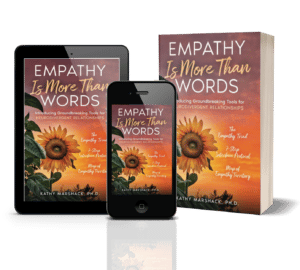
What do I mean by interface protocol? Another way of say it is, what rules of engagement would you have implemented early on? This involves creating a template for how you and your Aspie relate to each other. While it might be distasteful to think of having to design rules to live by, it’s pointless to expect your Aspie partner to give what they are incapable of delivering, such as empathy. However, if your Aspie partner can master the rules of engagement, even though true empathy is lacking, you can accept their intentions as honorable. They can learn to express their care for you with the right responses while really not understanding the empathetic reasons for doing so.
For example, a husband may leap up to help his wife if she trips and drops something. That’s the right response, but when questioned, his motivation might be, “because she’ll be mad if I don’t”, not the empathetic “she might have been hurt and needs comfort”. You can help your Aspie understand the rules of engagement by explaining, “This is how it works. Since men are macho and may not want help, the rule is that you can offer help once to a guy and if he refuses, it’s okay to let it go. But if a woman trips, I want you to offer to help her at least three times and don’t take ‘no’ for an answer. She really wants your help even if she says ‘no’. Okay?”
Would creating a rules of engagement playbook have helped you prevent the anguish and depression? Would you have moved on more quickly? There are a hundred questions. Within these questions we’ll find seeds for healing.
If you are a Neuro-Typical who wants to discussion this topic: “Would you do it again?” with a group of empathetic listeners, join us May 17, 2014 at our next Asperger Syndrome: Partners & Family of Adults with ASD Meetup in Portland, Oregon. Sign up to learn more about this group and find the details for the location. If unable to attend in person, you can also join our teleconference Meetup on the same topic on May 23, 2014 and connect with our international group of supporters.
Would you like to understand more of the scientific reasons why our Aspies do what they do and what we can do to help them? My new book, Out of Mind – Out of Sight: Parenting with a Partner with Asperger Syndrome (ASD) is packed full of insightful, scientific research discussed in layman terms, so you can not only grasp the concepts but have sensible suggestions to apply in your own situation.




This is your statement:
“This is how it works. Since men are macho and may not want help, the rule is that you can offer help once to a guy and if he refuses, it’s okay to let it go. But if a woman trips, I want you to offer to help her at least three times and don’t take ‘no’ for an answer. She really wants your help even if she says ‘no’. Okay?”
1. disgustingly sexist
2. If someone says ‘no’ that means ‘no’! You’re literally telling aspies (myself included) to keeping pushing and pressuring with consent when someone says no.
I understand your confusion over my anecdote. It certainly is not meant to teach you to press another against their will. However, while an “Aspie” May only read my written words, an NT would understand the intention behind the words.
For example, “No” doesn’t always mean “No.” it depends upon the context. Since the “Aspie” client in my anecdote missed the context of my tripping and spilling coffee — in the rain — and he offered no help — I decided to help him build a work around for empathy. Not only should he help a woman in a similar situation, he should learn that he can ask again if she says “No” the first time. The context implies that he would not be pressing her against her will. I doubt that anyone would see this interaction as sexual harassment.
However, your comments — coming from a self described “Aspie” — are very helpful in elucidating the discomfort many “Aspies” feel in a tough interpersonal situation. Sticking to your right/ wrong and fundamental black/white thinking, there is only one way to respond to a “No” response to an offer of help. To an “Aspie” that means to stop. Some “Aspies” would literally walk away at this point. Or they might even stand and watch the hapless person stumble along — as did the man in my anecdote.
My explanation, as clumsy as it may be, was an attempt to help this man do the right thing next time. Instead of waiting for the woman to be annoyed that he doesn’t offer help (and he reported that his NT wife was always angry with him), I suggested that he always offer help. Since he cannot recognize when a “No” means “No,” or when it is just an embarrassed “no,” or a polite “no” with a look of “thank you so much for asking,” I suggested he politely ask anyway. This is a rule a black/white thinker can understand.
To your point, reading the context is not sexist. Cultural norms are just that — contextual. This is also why “Aspies” are often socially clumsy. They miss important contextual cues (many of which are non-verbal). In fact sometimes “No” means “No” even when unspoken. For example, most women dealing with sexual harassment or even an outright sexual aggression do not say “No” verbally at first. They usually send non-verbal signals, such as freezing, stepping back, or demurring politely — all of which mean “No” to those who can read context. They often say “No” out loud, long after they should have. They have to be taught how to say “No,” which is against their cultural training. This is the reason that “Self Defense” classes for women emerged — to teach them how to say “No” through words and body language.
Circling around to the beginning of this exchange, I do understand your confusion. And I think it would have been too confusing to have my client learn the depth of meaning for an encounter like this. So instead I started with a simple black/white rule for him to follow. The explanation of culture and innuendo and non-verbal cues came later in his therapy. In the moment he just needed to learn a simple rule in order to be polite.
I’m neurotypical and I gotta say, the aspie that replied to your anecdote hit the nail on the head. If someone says “no” to help, respect what they’re communicating. Period. Don’t play games. If I offer you help and you say no, that’s it. I may say (as a follow up), “Okay, but just know it’s not an inconvenience for me and I’d be happy to help, so if you change your mind, let me know.”
But there shouldn’t be anything beyond this. I’m not sure where you’re getting the whole “men are macho and may not want to help.”
In my experience, it’s quite the opposite. The Machismo is what drives a man to want to be the hero and help. The vast majority of males want to help females and others around them. In fact, the vast majority of humans do. Altruism isn’t lost on most of us.
If you fall and you’re asserting the only reason you aspie partner is coming to your aid is simply to avoid you being mad at them because they are devoid of empathy and don’t care, the actual answer is to exit the relationship. It’s ridiculous to try to condone staying in a non-reciprocal or neglectful/abusive relationship that lacks empathy just because someone has Asperger’s or any other brain wiring.
If you’re in a relationship where you find yourself having to teach someone how to interact with you or socialize properly, It’s already toxic, so the better advice would be for both individuals to find someone more similar to their own so they can meet each others needs.
It wasn’t a clumsy antidote, it was just poor advice.
As a psychologist I am asked for help all of the time from both NeuroDiverse and NeuroTypical. I tend to offer rules to “Aspies” because it is easier than trying to figure out individual differences. It’s important to distinguish the difference between “fixing” someone and providing answers they will understand. But it is a conundrum isn’t it?
Having lived with an Aspie for almost a decade, I must tell you that you have no idea what mental and psychological destruction the emotional neglect that follows from a lack of empathy means.
Not only do you not understand that as a woman accepting help is more difficult, just as saying yes or no. Please do ask a woman twice if she is sure she doesn’t need any help. You are not asking for intimacy, but offering help. It also doesn’t say there: force yourself and your help onto her.
I find it almost destructive to point this out: but this very reaction screams of a lack of insight into human interaction.
If I knew mu husband had asperger’s I would not have married him. He has said & done very hurtful things & he knows it but just gives up. I’m weary & tired of how he treats me.
I am 46 and due to illnesses ( I had long covid and mono before that )my father ( who I am sure is Aspie ) swings from exceptionally caring and will be there for me, to ordering me around, showing up whenever he wants. I am financially dependent due to illnesses and before that depression. I am better now but the abuse is too much to handle with the guilt I feel to just stay away from him because I know he has done so much for me/
I tried to get him to understand that I have severe depression from how I was raised ( my mother didn’t care about me at all and drifted away) and my dad was there – will give me money, and do a lot for me ( like get me groceries when sick etc) and I think he really cares about me. And then he will swing after awhile to ordering me around and showing up and sometimes in bad moods, or aggressively kicking parcels that arrive at his place ( he has concierge) into my apartment, etc..I told him I have Ptsd. I don’t feel emotionally safe esp. as he refuses to simply ask to come over – ( I never say no when he does ask) I explain it and then instead he just says- well you come pick it up then ! I explain that I don’t feel like my autonomy is respected , that it does not make me feel worthy of respect. ) then he says I got it all wrong , he;’s going to have a nap.
I say I don’t trust you I say Im crying im suicidal…as I explained this for two years to just ask me to come over.. and not TELL me ” he texts me – ( I no longer let him call because he gets frustrated and shouts at me or hangs up on me in the middle of any chat ) he will text me ” Im coming over in 5 minutes” …I wrote it clearly – I don’t feel respected – that it gave me PTSD – I explained why over and over that I feel controlled.
He then just says but look how much I do for you ( which is a lot -!) or he says you are sucidal simply because I don’t put a question mark ?
And the next day he acts like nothing is wrong…and just talks about.
I am now thinking strongly about to going to Belgium to do do death with dignity because I have no way out of my situation. My dad just will put me in a hospital if I say I am depressed and what can they do ? medication cannot stop the emotional pain from having a father that swings from extreme caring to tyrannical , aggressive and controlling.
If I say I feel severely depressed from the treatment , he threatens me with jail or hospitals.
I tried to explain it over and over and over but he is not getting it but I don’t
Please can you help me I am trying to find a therapist but nobody will get back to me…
I am not mentally ill , other than depression due to my situation.
Dear Marianne. Your situation is dire. Your ASD parent obviously cares but has no idea how his words affect you. Do not despair. Seek outpatient therapy. This site is not designed for emergency services. Seek help from your community mental health services.
No, I would not have married him. While dating I became his new interest and he couldnt get enough of being with me. The day after the wedding he told me he didnt want to be married but didnt want a divorce because it would make him look bad to his friends and family. So, a few days later he started in with the silent treatment. He didn’t come home after work any longer but instead spent every evening at the bar instead. He never even helped to open the wedding gifts with me. The marriage didn’t include any sex or affection or conversation. No family life as I had expected as a new bride. The ignoring and shunning never ceased. And no I wasn’t allowed to speak my opinion because he would have a meltdown. Never a compliment but instead, put downs. I couldn’t do anything right and talked behind my back to everyone. If I begged for his touch, I would be thrown to the floor every time for 30 years until I finally escaped the crazy, torture and abuse. I’m sorry I stayed so long, I would do anything to get those years back. I would advise any young bride to RUN as fast as you can, unless you like being emotionally and physically abused for decades. They DON’T change ever. Don’t expect them to change because they are incapable of it! GET OUT NOW!
I am so sorry. This is a tragedy.
Liz, I feel for you and I am so sorry to hear of your heartache, however I am a firm believer that everyone deserves someone, it’s a matter of how to connect to the person we chose to love and marry. (I am struggling with my separation from my Aspie- his wish out of fear) but his mind blindness and not wanting to accept he might be different, (although he does know he is on the spectrum) makes it that much harder. I guess each person and relationship is different.